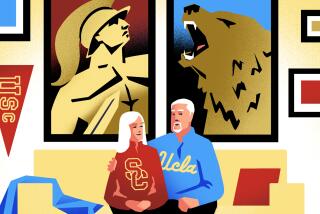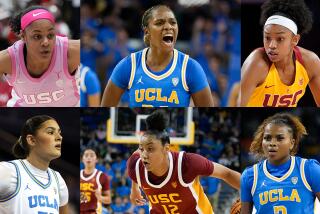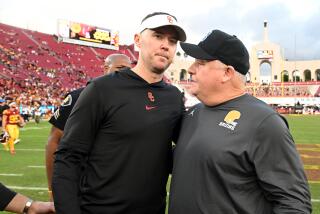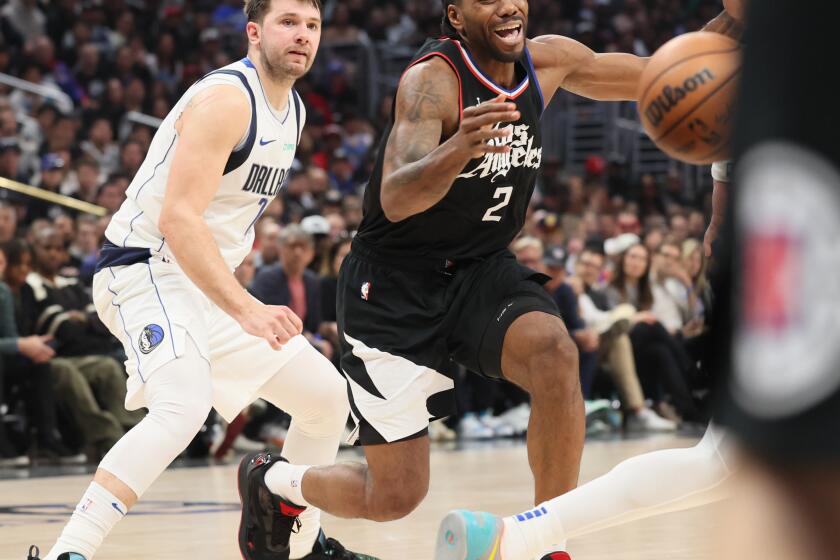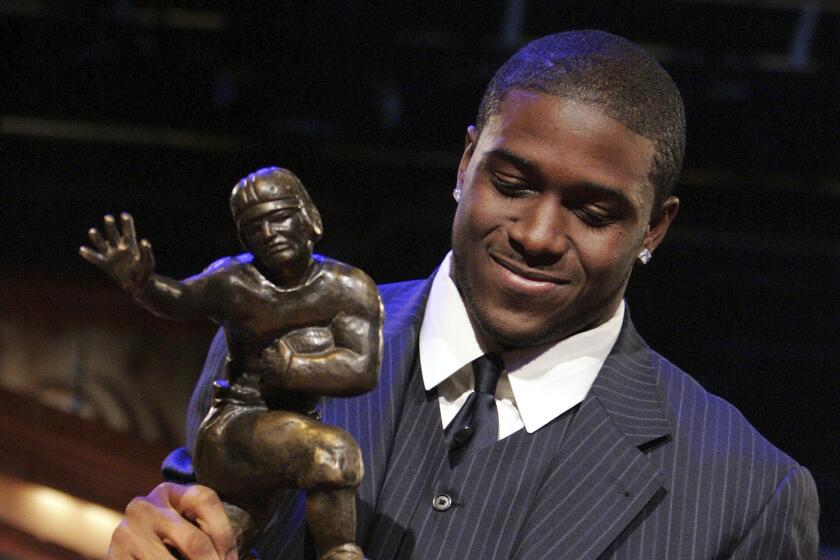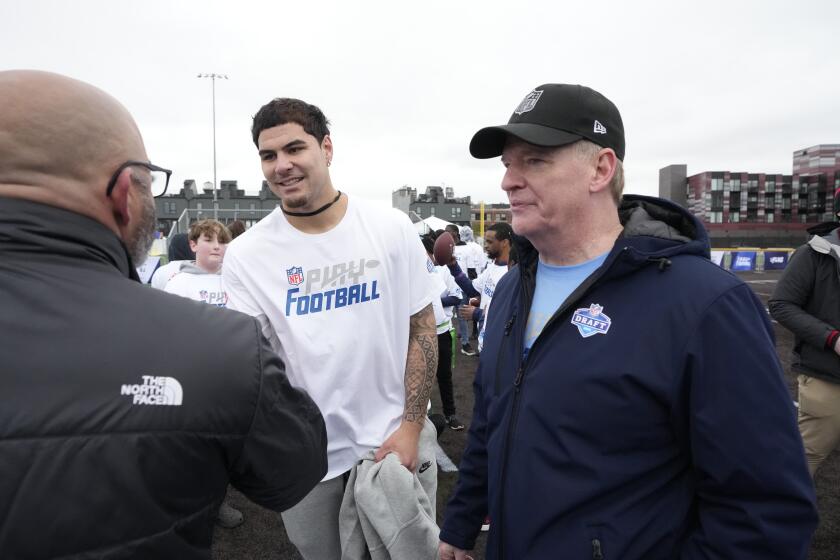Column: Fighting on over Pete Carroll
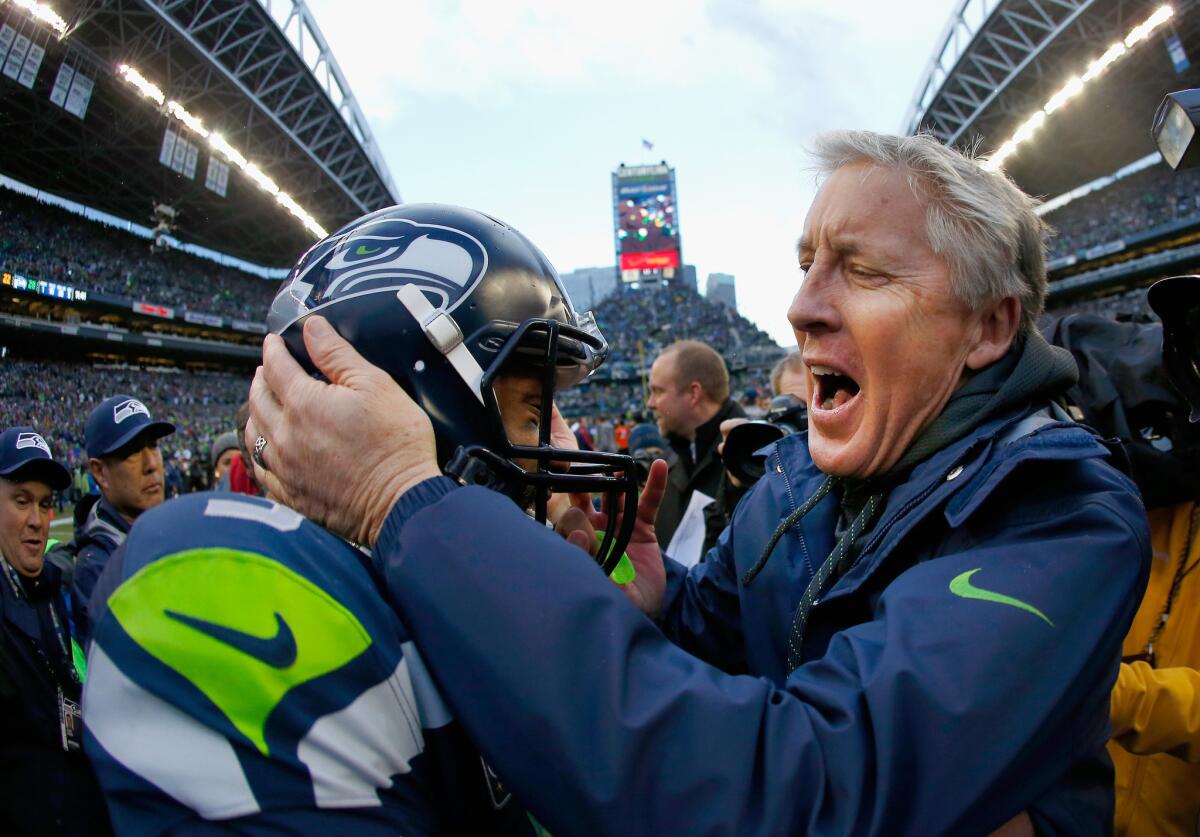
The Southland’s Super Bowl debate began a week early, at a church casino night in Baldwin Park, around a blackjack table with worthless chips and priceless banter.
On one side of the green felt, an esteemed member of St. John the Baptist Church was wearing a USC print shirt and occasionally wagging two fingers.
“You have to be cheering for Pete Carroll, he’s a great Trojan,” he said.
On the other side of the felt sat the man’s brother-in-law, who just shook his head.
“How can you cheer for Pete Carroll, he’s a cheat!”’ he said.
Some folks standing around the table laughed, other sighed, but pretty much everyone eventually glanced toward the ground in uncomfortable uncertainty. It was an awkward scene that undoubtedly will be repeated throughout Los Angeles living rooms and bars Sunday when Carroll’s Seattle Seahawks try to win a second consecutive Super Bowl in a greatly anticipated duel with the New England Patriots.
Around the country, the game is being viewed as Tom Brady’s brains versus Seattle’s boom, Beast Mode versus Belichick Mode, inflated Seahawks personalities versus deflated Patriots footballs. But in Los Angeles, for many, it is a duel featuring a single man, that endlessly energetic silver-haired guy running around the Seahawks sideline.
Is Carroll a hero, or a traitor? Should he be lauded for nine glorious years as head coach of USC, or scorned for the Trojans’ five probation-plagued years afterward?
Was Carroll the savior who boosted Los Angeles back into the center of the national college football conversation with two national titles and countless memorable moments? Or is he just a deserter who skipped town barely ahead of the NCAA posse that wrecked the program he abandoned?
Carroll is beloved by most USC fans, and last summer the school announced his induction into the Trojans Hall of Fame. But he is despised by UCLA fans stinging from his eight wins in nine seasons against the Bruins and reveling in the fact that two of those wins were later vacated.
Football’s most famous coach may be in a new world now, but he straddles no lines in his old one. You’ll be either really happy or really irked to know, Pete Carroll is still a diehard Trojan.
During one interview session this week, he noticed his questioners were students from Arizona State. He immediately chided them about USC’s comeback win here in 2003 that was the start of a 34-game win streak. He then ended his answer with those two wagging fingers.
Later, asked about his USC connection, Carroll became emotional, saying, “It’s deep. ... Everything we do now was really forged there in L.A. and I’ve never forgotten that.”
He added that it is no coincidence that the Seahawks regime — with its flashy personalities, big hits, and resilient wins — reminds folks of his Trojans teams.
“This philosophy, this approach, this language, everything that we do, this style of coaching people, really was brought together there, and I was so fortunate that I had the chance to do it at USC,” he said.
Asked about the stain left at USC from NCAA sanctions levied after he left — the Trojans were banned from bowls for two seasons, vacated 14 wins, and were docked 30 scholarships over three years — he turned terse and bitter.
“We were really wronged there,” he said. “I think it’s so obvious, so obvious.” He turned his head away in disgust. “I’m just not going to get into that here.”
Just as many believe Patriots Coach Bill Belichick must have known about his team’s deflated footballs, there are those who are certain Carroll knew about the living arrangement enjoyed by Reggie Bush’s family. There is also plenty of sentiment that Carroll knew the penalties would be harsh, and that’s why he bolted to the Seahawks. He signed a $33-million contract in Seattle in January of 2010, and the NCAA sanctions struck USC in June.
“The truth was, an opportunity came up and it was one I couldn’t turn away from,” Carroll told the Times’ Gary Klein last year. “I had no knowledge that was coming. We thought maybe it wasn’t coming because they didn’t have anything to get us with.”
His supporters say Carroll shouldn’t be ripped for chasing big money and a once-in-a-lifetime opportunity at total control of a deep-pocketed NFL franchise.
Carroll wasn’t ripped by this columnist for leaving. Rather, readers were urged to thank him for nine great years. But when the penalties hit five months later, Carroll was criticized here for creating the sort of loose culture that infuriated the NCAA and left his program in shambles.
Pete and the illegal special teams consultant. Pete and Joe McKnight’s Land Rover parked in front of the practice field. Pete and the defiant wave he gave to any rule that didn’t suit him.
Carroll coached the Trojans like he has coached the Seahawks. A cool thing now, a troublesome thing then. It was Carroll’s swashbuckling arrogance that led to the NCAA throwing down a giant hammer in what was essentially a petty attempt to get even.
The Trojans didn’t deserve the harsh penalty by what has since been exposed as a vengeful NCAA, but Carroll kept asking for it, and asking for it, and now the only remaining question is lodged in the hearts of Los Angeles football fans.
Were those nine years of excitement worth the five years of embarrassment since? The coming-out party in the Orange Bowl against Iowa? The blowout of Oklahoma for the undisputed national title? The Bush Push in South Bend? And even though they lost, don’t forget Carroll’s Trojans battled Texas to the final seconds in what might have been the greatest game in college football history.
Was he a hero? Was he a cheater? Was he a deserter? In the end, maybe the best definition of Pete Carroll’s legacy here is that he was memorable, enduring in his greatness, permanent in his flaws, an perfectly imperfect part of Los Angeles sports history.
Five years later, his devotees and detractors fight on.
Twitter: @billplaschke
More to Read
Get our high school sports newsletter
Prep Rally is devoted to the SoCal high school sports experience, bringing you scores, stories and a behind-the-scenes look at what makes prep sports so popular.
You may occasionally receive promotional content from the Los Angeles Times.

